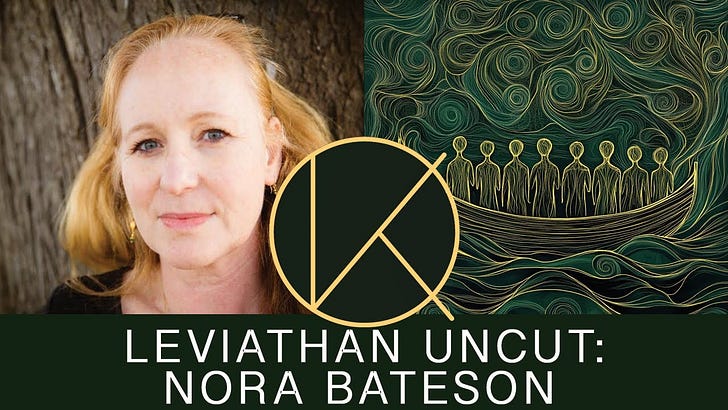Thank you to everyone who’s been watching and sharing Leviathan. We’re closing in on 50,000 views in two weeks which has feels incredible. If you haven’t watched it yet, you can still arrange a private screening here; it can be as small some of your friends gathering in a living room, or as big as a theatre or community center.
Since we released the documentary, a few people have asked me ‘what exactly is the Leviathan?’ I had a feeling that might come up, as we intentionally left it ambiguous. Why? Because it’s a metaphor that points to a shadow in the human condition, and our shadows can never be fully seen.
The temptation can be to see this kind of metaphor as a cop-out. To want to know exactly what the problem is, and how to fix it. However, that linear mindset is the problem.
Nora Bateson is an essential voice in systems thinking precisely because she challenges this notion, urging us to move beyond the need for limited linear solutions to problems, and instead learning how to hold them as aspects of a complex web of relationships that are combining and changing while we try to make sense of them.
As I put it in the documentary, the Leviathan is a force within human nature that pulls us toward disconnection and over-abstraction. A force that believes quantity is more real than quality, calculation is more real than subjectivity, and ideas more real than embodied experience. Due to its rigid and linear blindness, it constantly places us in what Gregory Bateson referred to a double-bind. A double-bind is a situation where you’re damned if you do and damned if you don’t, in which you’re faced with two conflicting messages.
A parent telling their child they love them, while emotionally withdrawing.
A person who only feels happy making art, but lives in a society where making art can’t pay the bills.
A partner tells their beloved to be their authentic self, but then criticizes their authentic self.
Our economic and social systems are double-bind generators. By splitting off the quality of human experience from the quantity of what we can measure and accumulate, they often force us to sacrifice what matters most for material gain and survival. Scott Alexander personifies this as Moloch in his seminal essay Meditations on Moloch. The Leviathan is inspired by that metaphor, but looks to take it further to ask what generates it. What is the deeper shadow in the human mind that leads to the game theoretic traps of our economic systems.
As Nora explains in her full interview, the way out of a double-bind is to add more context. At its heart, the Leviathan is a way of seeing the world that takes aspects of a systems and rips them from their context.
As Iain McGilchrist put it in our recent conversation, that is one way to define of abstraction. It’s the left-hemisphere’s way of understanding the world; taking an aspect of something and removing it from its web of relationships to analyse it as a distinct entity. That act in itself is an act of fantasy. Useful fantasy, but fantasy nonetheless.
We need abstractions; some of our most powerful ideas and ways of being in the world are rooted in abstractions: human rights, scientific discovery, political theory. Where it leads to trouble is when our abstractions become dominant, and ignore the contextual, relational, embodied reality they rely on. When, as McGilchrist puts it, the emissary starts to think it’s the master.
You can access Nora’s full interview along with many more by becoming a paid subscriber to Kainos for just $6 a month, or 0.000012% of Jeff Bezos’ Venetian wedding.
Keep reading with a 7-day free trial
Subscribe to Kainos to keep reading this post and get 7 days of free access to the full post archives.




